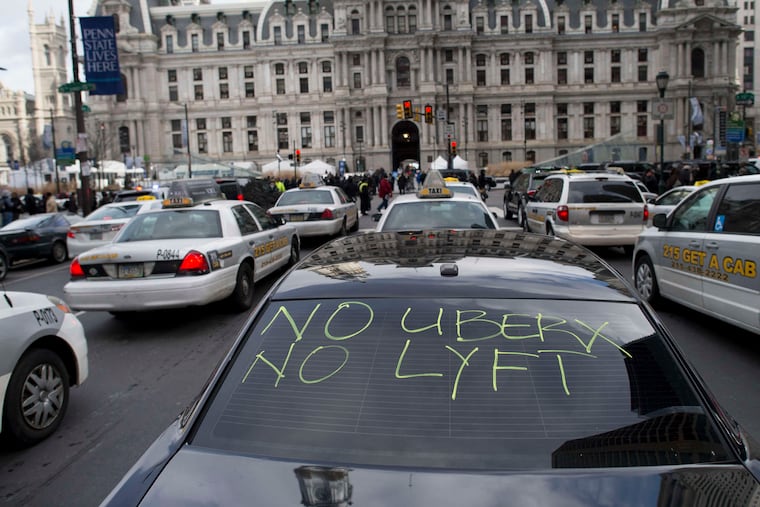Philly Uber and Lyft drivers will join a global day of action on Wednesday
It’s the first global gig economy action of this scale.

Uber and Lyft drivers across five continents have planned a day of action Wednesday — the day before Uber’s initial public stock offering, one of the biggest in tech-industry history — to protest pay cuts and what they describe as unfair working conditions.
>> READ MORE: ‘Invest in drivers, not in stock’: Uber and Lyft drivers rally in global day of action
At noon Wednesday at the Southwest Philadelphia Uber driver headquarters, drivers in Philadelphia, led by the Philadelphia Drivers Union and Philadelphia Limousine Association, will join others participating in the day of action in more than two dozen cities. The cities, according to Yaseen Aslam of the United Kingdom-based United Private Hire Drivers, include Sydney, Australia; Nairobi, Kenya; Sao Paulo, Brazil, and Los Angeles, whose drivers held a 25-hour strike in March.
It’s the first global action of gig workers of this scale, says Todd Wolfson, a Rutgers University professor who studies organizing in the gig economy.
The day of action varies from city to city: Some drivers, like those in New York, are going on strike for a set period Wednesday, while others, like in Philadelphia, will still work, saying that they can’t afford to miss any time off, but they’ll rally at noon. Still others, like in Melbourne, Australia, are doing a “drive around,” a caravan of ride-sharing cars during peak hours.
>> READ MORE: Philadelphia drivers’ lawsuit a risk to Uber as tech giant prepares to go public
“The driver members of PDU and PLA are a community in crisis, many living one missed day of work away from vehicle repossession or missed medications,” the Philadelphia drivers’ statement reads.
There are about 25,000 ride-sharing drivers in Philadelphia, according to the Philadelphia Parking Authority, but it’s unclear how many will participate in the noon rally.
Some Philadelphia drivers, like many drivers in big U.S. cities, say they’ve seen their take-home pay drop over the last few years, making driving for the ride-sharing companies untenable.
“You’re working harder, and you’re getting less," said Rasheedah Ahmad, an Uber and Lyft driver who told The Inquirer she used to be able to bring home $1,000 in a weekend when she started driving in 2016. Now she says she can’t make that in seven days.
These changes come as Uber seeks to become profitable and attractive to investors. In its S-1 filing, it said that the amount that it makes on each ride increased to 21 percent in 2017 from 16 percent in 2016 “as a result of declining driver incentives,” Quartz reporter Alison Griswold reported last month in her newsletter Oversharing. It increased again, Griswold pointed out, to 22 percent in 2018 on “increases to booking fees in select markets.”
>> READ MORE: At Philly airport, Uber and Lyft drivers wait and wait, gambling on a big pay day
Wednesday’s day of action is significant because it was widely accepted that gig workers, who are independent, are nearly impossible to organize. But in the last few years, these workers, from ride-sharing drivers to delivery couriers and domestic workers such as house cleaners and nannies, have changed that narrative, organizing strikes, creating support networks via social media, and winning legal rights.
In 2014, Aslam, of the U.K.-based United Private Hire Drivers, said every academic, union leader, and journalist he spoke to said Uber drivers could never be organized.
“'They are unskilled, stuck in poverty, and will never stand up,'” Aslam said he was told.
“Now," he wrote via Whatsapp, "a global network for drivers are working together to fight back!”
In a list of demands that are similar to what Rideshare Drivers United Los Angeles, the group that organized the California strike, called for, the Philadelphia Drivers Union and Philadelphia Limousine Association include:
an 80 percent/20 percent split of gross passenger receipts between the drivers (80) and the ridesharing services (20).
a minimum wage of $20 an hour after expenses.
transparency and a voice around deactivations, which happens when drivers are kicked off the platform for low ratings and sometimes unknown factors.
The groups are also asking that Philadelphia residents vote against Ballot Question No. 4 in the May primary, which asks if a “new class of law enforcement officers” should be created to help police enforce traffic codes.
Staff writer Jason Laughlin contributed to this article.